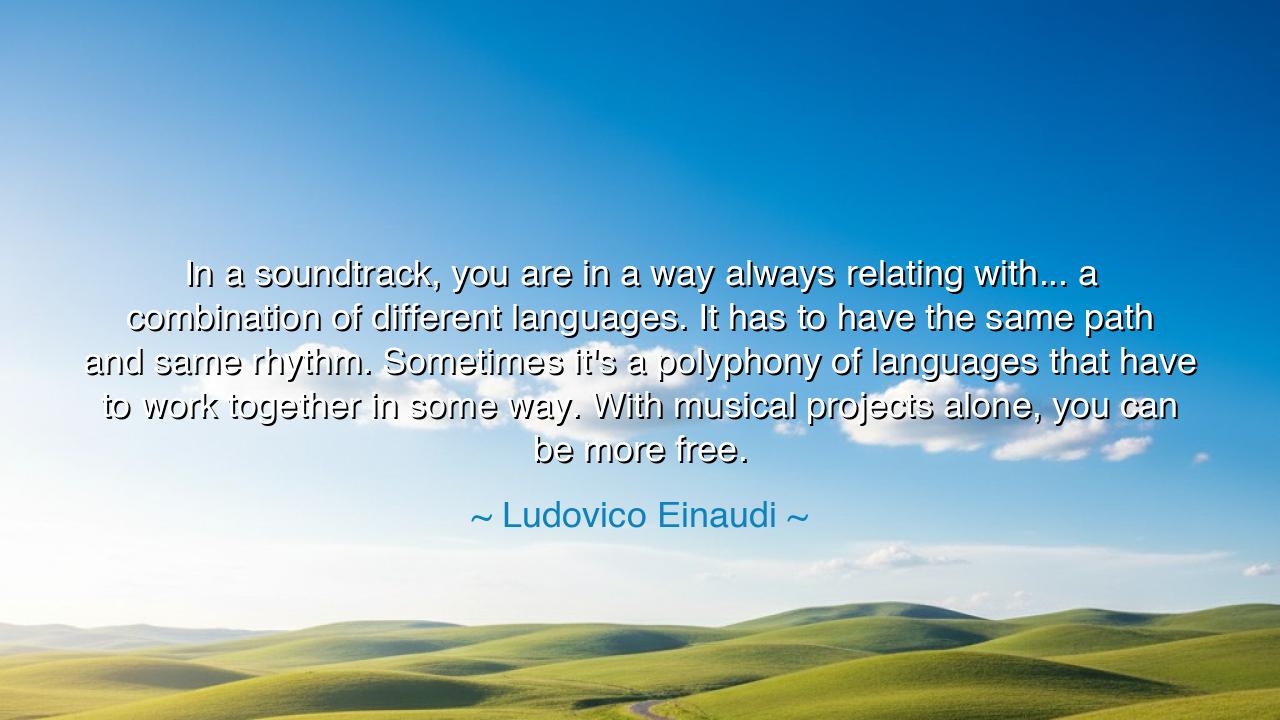
In a soundtrack, you are in a way always relating with... a
In a soundtrack, you are in a way always relating with... a combination of different languages. It has to have the same path and same rhythm. Sometimes it's a polyphony of languages that have to work together in some way. With musical projects alone, you can be more free.






In the tranquil and profound words of Ludovico Einaudi, master of silence and sound, we find a reflection that transcends music itself: “In a soundtrack, you are in a way always relating with... a combination of different languages. It has to have the same path and same rhythm. Sometimes it’s a polyphony of languages that have to work together in some way. With musical projects alone, you can be more free.” This is not merely a statement about composition; it is a meditation on harmony, cooperation, and the sacred art of balance. For Einaudi, music is not bound by sound alone — it is a dialogue of souls, a weaving of languages, each with its rhythm and meaning, converging to create something greater than itself.
The soundtrack, he tells us, is not the solitary voice of the artist, but a symphony of voices: image, story, character, silence, and sound — all speaking together. It is a polyphony, a weaving of tongues where no one element must overwhelm another. The music must listen as much as it speaks. It must follow the rhythm of the story’s heartbeat, the rise and fall of emotion, the breath of the unseen. The composer of soundtracks is not a ruler but a servant of the whole, guiding each language — visual, emotional, musical — into a single path. Thus, creation becomes an act of communion, not domination.
The ancients, too, knew this wisdom. The Greeks called it harmonia, the sacred alignment of opposites — the ordering of chaos into unity. When Pythagoras heard the music of the spheres, he taught that all existence is born from vibration, that every planet, every being, every thought resonates in relation to another. So it is in art, and so it is in life. When Einaudi speaks of the polyphony of languages, he echoes this eternal truth: that beauty emerges not from one voice shouting above the rest, but from many voices breathing together in rhythm.
Consider the story of Einaudi himself, composing the haunting soundtrack for The Intouchables. He did not write music merely to decorate the film — he listened to its silences, its smiles, its unspoken griefs. His piano became the heartbeat of the story, not its ornament. Each note carried the weight of friendship, dignity, and transformation. The music did not demand attention; it flowed like blood beneath the skin of the narrative, invisible yet essential. This is the sacred humility of the soundtrack composer — to create beauty that serves, rather than commands.
Yet Einaudi also speaks of freedom — the kind found in composing alone, when the artist’s dialogue is solely with his own soul. In such works, the music is bound to nothing but itself; it can wander, dream, and unfold without constraint. It is the difference between walking among others and walking alone beneath the stars. One demands harmony, the other invites exploration. Both are sacred — for one teaches the discipline of unity, and the other, the courage of solitude.
From this, we may draw a greater lesson. Life, too, is a soundtrack — a composition of many languages: love, duty, ambition, sorrow, joy. Each moment, each relationship, adds a note to the melody of our existence. To live well is to find rhythm among these voices, to let them coexist without discord. Yet we must also know when to step away, when to compose in solitude, when to listen only to the whisper of our own spirit. For freedom without harmony is chaos, and harmony without freedom is silence. The art of living is to hold both in balance.
Therefore, my child, learn from Einaudi’s wisdom. In your work, your love, your creation — seek the polyphony of life. Do not demand that your voice dominate, but let it blend and lift others. Listen deeply — to the language of others, to the rhythm of the moment, to the music beneath words. And when the noise of the world grows too loud, rise into solitude, as he does with his piano, and rediscover your freedom.
For in the end, every life is both soundtrack and song — sometimes woven in harmony with the world, sometimes sung alone into the silence. The wise soul, like Einaudi, learns to dance between the two: to serve the greater rhythm when called, and to create his own melody when the heart demands it. In this balance, there lies both art and peace — and the music of existence itself.






AAdministratorAdministrator
Welcome, honored guests. Please leave a comment, we will respond soon